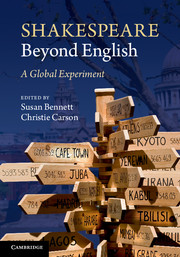Book contents
- Frontmatter
- Contents
- List of Illustrations
- List of colour plates
- Notes on contributors
- Foreword
- Acknowledgements
- Introduction
- The Globe to Globe Festival: An Introduction
- Performance Calendar
- Week One
- Week Two
- Week Three
- Chapter Seventeen Power play
- Chapter Eighteen Locating Makbet/Locating the Spectator
- Chapter Nineteen ‘Who dares receive it other’
- Chapter Twenty Two Gentlemen of Verona for/by Zimbabwean Diasporic Communities
- Chapter Twenty-One Inter-theatrical Reading
- Chapter Twenty-Two ‘This is our modern history’
- Week Four
- Week Five
- Week Six
- Afterwords
- Index
- Plate section
Chapter Twenty-One - Inter-theatrical Reading
Theatrical and multicultural appropriations of 1–3 Henry VI as a Balkan trilogy
Published online by Cambridge University Press: 05 June 2014
- Frontmatter
- Contents
- List of Illustrations
- List of colour plates
- Notes on contributors
- Foreword
- Acknowledgements
- Introduction
- The Globe to Globe Festival: An Introduction
- Performance Calendar
- Week One
- Week Two
- Week Three
- Chapter Seventeen Power play
- Chapter Eighteen Locating Makbet/Locating the Spectator
- Chapter Nineteen ‘Who dares receive it other’
- Chapter Twenty Two Gentlemen of Verona for/by Zimbabwean Diasporic Communities
- Chapter Twenty-One Inter-theatrical Reading
- Chapter Twenty-Two ‘This is our modern history’
- Week Four
- Week Five
- Week Six
- Afterwords
- Index
- Plate section
Summary
Shakespeare's plays are some of the most frequently produced works in the national repertoire in Serbia, Albania and Macedonia. His work came to the Balkans at the end of the nineteenth century, translated and adapted from the German, as part of the European-wide Romantic Movement. The plays have been part of a growing national consciousness that arose in different Balkan nations at different times throughout the nineteenth and early twentieth centuries. Nations recently liberated from the Ottoman empire appropriated Shakespeare as a way of connecting themselves with the wider framework of European culture. Moreover, in translation Shakespeare's iambic pentameter sounds like epic heroic poetry, which dominated the oral tradition in Serbian, Macedonian and Albanian cultures. This greatly helped to localize Shakespeare within people's experience, making the plays sound like the stories from their national cultures.
By bringing Serbian, Albanian and Macedonian national theatres and their directors’ visions together through the three parts of Henry VI, the ‘Balkan trilogy’ worked as an intercultural mini-festival within the Festival proper. I came to these productions interested in how the first plays about England's civil wars would be seen through the experience of recent civil wars in the Balkans. I wanted to know how Shakespeare's plays would be used for a collaboration between three well-established national theatres. However, I was to discover that this was an organizational grouping initiated by the Globe and based on national contexts (some might say prejudices) that suggested which nations could best understand Shakespeare's 1–3 Henry VI; this was a marriage of expedience that inadvertently produced a number of inter-theatrical connections once the three quite different interpretations had been seen at the Globe. Ideas of closeness, misunderstandings and the domestication of Shakespeare in response to the realities of history helped to unite these three quite disparate performances.
- Type
- Chapter
- Information
- Shakespeare beyond EnglishA Global Experiment, pp. 161 - 169Publisher: Cambridge University PressPrint publication year: 2013

